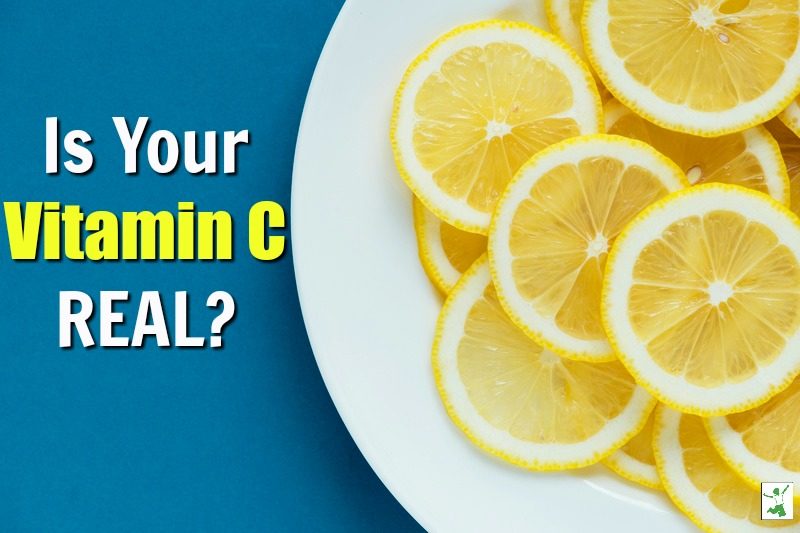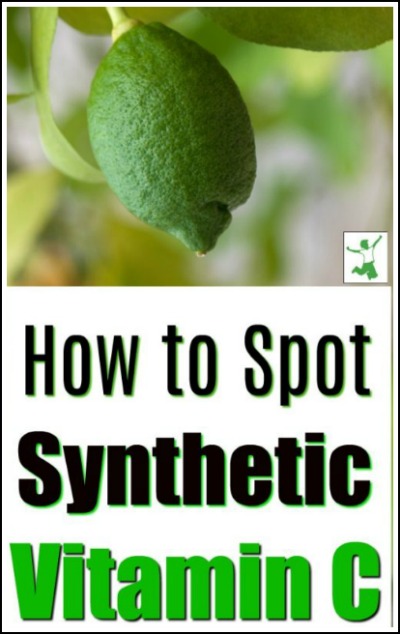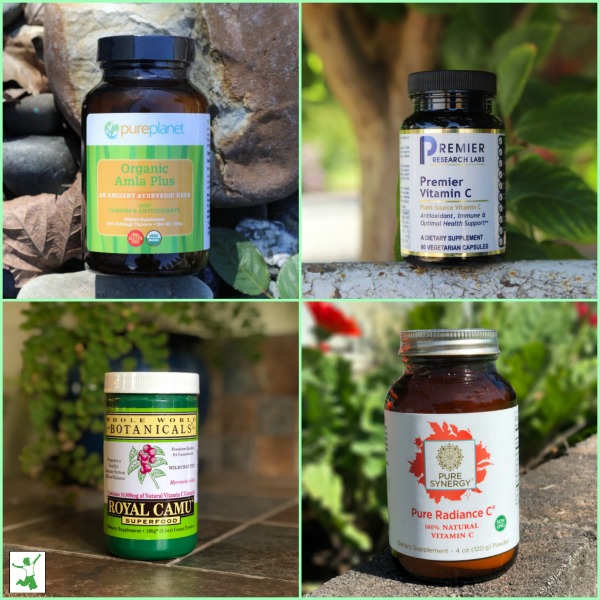Table of Contents[Hide][Show]

Did you know that ascorbic acid is actually synthetic vitamin C? What’s more, it is usually GMO vitamin C, which means it was derived from GMO corn.
If you are learning this for the first time, it can be a rather shocking realization as almost all vitamin C supplements on the market use isolated ascorbic acid separated from a whole food source. The manufacturing process that produces synthetically derived vitamin C leaves all the beneficial co-factors behind!
Even more disturbing, ascorbic acid is frequently marketed as natural vitamin C and added to organic foods as a natural preservative. Truly natural forms of vitamin C and synthetic ascorbic acid seem to be used interchangeably.
How confusing for the consumer!
Nearly all juices and fruit products are loaded up with ascorbic acid, even many organic, healthfood store versions. It seems that if a product is labeled “high in Vitamin C”, consumers buy more of it.
A lot of folks are being fooled by these misleading semantics. There is a growing body of evidence that those consuming high doses of ascorbic acid should have reason to worry.
Three Studies Suggest Caution with High Dose Ascorbic Acid
The journal Wise Traditions cites three studies that give pause about large doses of vitamin C. The first, from the Jun 15, 2001 issue of Science, showed that “synthetic vitamin C may contribute to the formation of genotoxins that can lead to cancer”.
A second study presented to the American Heart Association showed a link between consumption of only 500 mg of vitamin C per day and a greater propensity toward thickening of the arteries (Los Angeles Times, March 3, 2000).
More recently, athletes taking 1000 mg of isolated ascorbic acid per day showed reduced endurance capacity from interference with antioxidant enzymes (American Journal of Clinical Nutrition, Jan 2008).
This information should give pause to anyone who is actively taking synthetic vitamin C supplements such as those Emergen-C packets that are available everywhere, from pharmacies and health food stores to even gas stations!
Supplements like these are NOT boosting immunity and are NOT good for you!
Synthetic vitamins such as ascorbic acid act more like drugs in the body rather than whole food nutrients with all the available co-factors. Taking any synthetic vitamin can cause imbalances in the body and should be avoided.
Another worrisome and popular trend is the recommendation of some alternative health professionals to do a “vitamin C flush” during illness. This therapy (if you can call it that) calls for large doses of ascorbic acid until the onset of diarrhea.
This approach to regaining wellness has never made any sense to me. Now, with more studies indicating the danger of high doses of vitamin C, caution seems well-founded.
Fan of Linus Pauling? Consider This…
If you are a fan of Linus Pauling who popularized the notion of huge doses of Vitamin C for the common cold in the 1970s, consider this. GMO Vitamin C did not exist when Pauling was conducting his studies. GMO derived Vitamin C is what most people are unwittingly taking today!
What’s more, the studies indicating the danger of high doses of vitamin C over long periods of time had not been done yet. They were conducted long after Pauling died in 1994.
What about High Dose, Intravenous Ascorbic Acid?
What about high dose, intravenous ascorbic acid for the very ill? Note that vitamin C for IV use is almost always derived from GMO corn as well as being extremely high dose and synthetic ascorbic acid only.
Under certain circumstances and for the very ill, high dose GMO ascorbic acid therapy can be beneficial. For example, my husband used IV ascorbic acid therapy immediately after each amalgam removal. This prevented any released mercury from getting stored in the tissues. Not doing this risks the development of autoimmune disease.
However, synthetic vitamin C especially when genetically modified shouldn’t be a regular feature in anyone’s diet or supplement regimen.

Whole Food Vitamin C is Naturally Low Dose
The best way to get vitamin C on a daily basis is from whole foods sources. This will provide you this critical nutrient at a low dosage that will do no harm over the long term.
When you get the whole foods version of vitamin C, you don’t need much at all. A truly natural vitamin C supplement with no isolated ascorbic acid is naturally low-dose and yet highly effective.
Don’t forget about the benefits of fresh grassfed milk – a great source of vitamin C. The vitamin C in milk is mostly destroyed by pasteurization, along with many other nutrients. This is why buying fresh and local is so important.
Fresh and lacto-fermented fruits and vegetables (such as traditional sauerkraut) are other excellent sources of the whole vitamin C complex.
Perhaps folks feel the need to take large doses of synthetic vitamin C because all the processed foods they are eating are so devoid of the nutrient in its whole form. Switching to whole foods and dumping those vitamin C supplements in the trash would be a much better approach to boosting immunity!
Ascorbic Acid is Usually from Genetically Modified Corn
What’s worse is that ascorbic acid is not just synthetic. Remember that it is also usually derived from genetically modified corn! More on that GMO vitamin C travesty fooling millions of consumers every single day in the linked article.
Another vitamin scam harming consumers concerns synthetic folate commercially known as folic acid.
The pushing of beta carotene as true vitamin A by food manufacturers and supplement companies is another nutritional falsehood scamming millions of consumers and worse, seriously harming their health.
What to Look for in a True Vitamin C Product
To give you some idea of what to look for in a vitamin C supplement, here are the ingredients of the one I use. Notice that there is no isolated ascorbic acid or other ascorbates and no additives. Just pure food Vitamin C sources. Please note that this is not the only Vitamin C supplement that qualifies as totally pure. There are a few others.
Pure Radiance C ingredients: camu camu berry extract, manioc root, acerola berry extract, amla berry extract, buckwheat sprouts, freeze-dried berry blend, blueberry, raspberry, cranberry, cherry, rose hips fruit, lemon peel, black pepper berry extract.
I also use the Amla C Plus. Here are the ingredients: Organic Amla berry, organic spirulina.
Notice that the words “ascorbic acid” are not listed in either of these products!
Want to know where to find a complete line of whole food Vitamin C supplements from a variety of whole food plant sources?
Click here for several carefully vetted brands to choose from.









liquid pure L-ascorpic acid (with no added buffering components) can be order from you’re local pharmacy.
This is an excellent article. Thank you for pointing out that manufactured ascorbic acid from GMO corn is NOT the same as natural vitamin C. My daughter is highly allergic to corn in all it’s forms and ascorbic acid has caused some of of her worse reactions. I do not believe it’s a supplement anyone should be consuming.
I just wanted to point out that there’s no such thing as a Vitamin C complex and anyone touting it or selling is just taking your money. Vitamin C’s name is L-Ascorbic-Acid just like all the other Vitamin’s have a name. The studies on Vitamin C are all on Ascorbic Acid and if you remove ascorbic acid from the equation the studies fail and don’t have the same results. Ascorbic meas no scurvy which is how it was discovered.
That being said, you have 2 forms of Vitamin C: l-ascorbic-acid (found in nature) and d-ascorbic-acid (not found in nature and must be synthesized). L-ascorbic-acid is what is recommended and it can be taken as a concentrated powder or via food. Yellow peppers, aerola cherries, camu camu, kaduku plum, Guava, Sea Buckthorn Berries, Rose Hips, & Amla are all excellent sources of Vitamin C so if you don’t want to take the extracted form you don’t have to.
I want to scream like the corn in the picture.
I wonder what they’re using in Vitamin C IV-therapy? I’ve read the results are almost miraculous in treating cancer.
We take acerola powder daily. Within 3 months of adding it to our diet, my severe gluten allergy was fully healed.
interesting idea
despite so many people swear by it, i could not tell the difference from C (ascorbic acid) (either for cold/fu whatever). makes no difference.
it is hard to imagine our primate ancestors ate hundreds of orange every day tho.
regards
The ancestors also rarely lived past 32 years of age.
Sorry, this is a total myth. Life expectancy was skewed by a high death rate for children under 5. If a person made it to age 5, the chances of living to a ripe old age were very good.
Pam, they don’t need to. Vitamin C is rich in most fresh vegetables. The mountain gorilla gets around 3,000 mg a day from his diet. You don’t need just citrus fruits for Vitamin C.
We shouldn’t need ANY dietary Vitamin C because our bodies should be making around 200 mg per hour. We have a fault in our chemistry.
Studies can be found showing the “toxicity” of about anything. Since the public responds so well to fear mongering, these are the studies that make hay on the Internet to an ill informed public.
The studies you cite on the “dangers” of asoribic acid are flawed statistically and in design. The average person is unable to sort this out.
There are thousands of studies showing the benefits and safety of ascorbic acid–compared to the three you focused on.
Exactly how does does a GMO source change the biochemical structure of ascorbic acid to make it somehow toxic, as you imply? Perhaps you could explain why “toxic GMO ascorbic acid” can both prevent and cure scurvy–overt vitamin C deficiency disease.
Such an informative article AND responses. Thanks for the information, love a good read!
You are absolutely on point. When people make an effort to become reasonably FEERLESS they become healthy human beings on so many levels.
Interesting, but confusing and probably not accurate. L Ascorbic Acid is vitamin C, and there is no difference I know of between anything called “natural vitamin C” and the chemical L ascorbic acid (L meaning it is the left-handed isomer). I generally agree that it is better to get vitamins from food rather than taking it in a pill. The reasons for this have to do with the body’s signals for absorption of these nutrients. Vitamin D has a very complex absorption process, so if you take a vitamin D pill, it may or may not be absorbed, depending on if your body is calling for it, or ready for it. The same is true of vitamin C – loading up on it probably does no good unless you are truly deficient. I had heard that overdosing on antioxidants can defeat your body’s cellular processes involving immunity.
I agree and would like to add that any study done with just the taking of ascorbic acid could cause those results that is why it is soooooooo important to take those high levels of ascorbic acid with fat. I highly recommend checking out herbsplusbeadworks on YouTube (Tony Panteleresco, Canadian herbalist), he just did a beautiful video on this. Sarah, thank you so much for all that you share I really appreciate it and put it all to good use! Blessings!